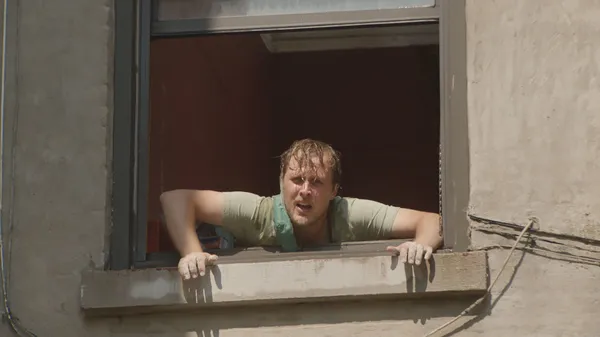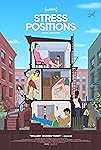Eye For Film >> Movies >> Stress Positions (2024) Film Review
Stress Positions
Reviewed by: Jeremy Mathews

“Not everyone is trans!” Terry Goon exclaims as tensions reach a climax over his nephew Bahlul’s birthday cake. It’s the summer of 2020, amid the height of Covid panic in New York City, so the only other person present is Terry’s friend Karla, who invited herself under the pretense of treating Terry’s back pain. But she’s mainly there to get a look at Bahlul, a young male model whose presence has captured the imagination of Terry’s friends.
Karla is trans and Bahlul wants to hear her story. She tells him he’d make a cute woman. Terry does not want to corrupt his nephew, who grew up in Morocco, or anger his Muslim sister. But he spends so much time worrying about this corruption that he never stops to think that maybe Bahlul is there because he wants to be part of his uncle’s world.
This moment punctuates a rambunctious, loud, exhilarating dialogue scene that embodies Theda Hammel’s Stress Positions, a hilariously biting film that allows its characters to be their bitter, failed selves rather than part of a political message. It’s as if the anti-heroes of a sitcom like Seinfeld or It’s Always Sunny In Philadelphia were grappling with their wasted youth and existential dilemmas while the comedy continued to mount.
Starring John Early as Terry and Hammel as Karla, the actors and characters are almost all part of the LGBTQ community, but this is not an anthem so much as a rumination on collective failures and missed opportunities. When Bahlul (Qaher Harhash) asks Karla if she always knew she was a woman, she describes her transition as making herself a little less suicidal.
Hammel could have made a delightful film solely with her wry wit, sharp observations and comedic timing. Or she could have made a memorable one with only her preconception-snapping, open exploration of queerness and generational dynamics. But apparently all that wasn’t good enough for her debut feature, so she rolled all those things into a strangely, compellingly complete masterpiece that smashes form with the causal air of a stoned slacker. Don’t let the light and easy feel fool you, Hammel knows exactly what she’s doing.
Terry is a loser who is getting divorced from his older, rich husband and has nothing going for him now that he’s not young and beautiful. He’s living at his soon-to-be-ex-husband’s “party house,” whose main function appears to have been hosting orgies, so Terry has done his best to do away with or hide most of the props and costumes – though the gas masks prove handy during the pandemic.
A period piece set during a time that most films seem happy to forget, Stress Position captures the Covid era perfectly. Early, in particular, embodies the cloistered, paranoid, panic-ridden and inconsistently cautious spirit of the times as he sprays Lysol around his food delivery while desperately trying to enforce mask policies, except, of course, when he completely forgets.
Stylistically, the work flirts with a sort of chaotic natural realism while juxtaposing it against poetic, borderline surreal rhythms. In the dirty brown tones of the apartments, in the lingering shots, in the isolated despair and human foils, we feel the heat of the New York City summer and identify with the stir-crazy characters. But at the same time, an oneiric feeling takes hold.
In a purely literal sense of the visuals, we’re just watching a story – there are no dream sequences or anything. But Hammel finds striking images that both generate laughs and linger in the mind. A man desperately tries to move a giant disco ball out of a house. A wannabe Instagram sensation burns an American flag out the window on the Fourth of July, her execution as poorly thought out as the stunt itself. An old chain smoker casually watches, on a giant black-and-white projection screen, footage from the room two stories below her, presumably a remnant from the party house days. On another projection screen, a wedding DVD shakes its way through old, fleeting memories while a young man pauses the screen in the hopes of finding his own recollections.
But the biggest contributor to the elevated sense of wistful lyricism is the device that so many young filmmakers are afraid to utilise: voiceover. Two different characters narrate the film: Karla, who gives us the background information on the on-screen narrative, and Bahlul, who tells his own story as well as that of his mother, while the main plot unfolds. The voiceovers switch when Bahlul accidentally swaps notebooks with Karla’s girlfriend Vanessa (Amy Zimmer), a semi-successful published author who, according to Karla, lifted her novel from Karla’s life. Karla uses this detail as justification for not contributing rent money – or much else – to her relationship. If Karla is right and Vanessa is writing in her voice, it makes sense that the two notebooks represent the two narrators.
Bahlul's voiceover reveals a story that rhymes with the on-screen narrative. Sometimes the rhymes show thanks to the camera lingering on a prop on a shelf; sometimes developments in each story have uncanny parallels. The result elevates the hilarious, farcical comedic components to an equally cool yet much more indelible meditation on how people forget to look out for the younger generation.
Reviewed on: 05 Apr 2024















